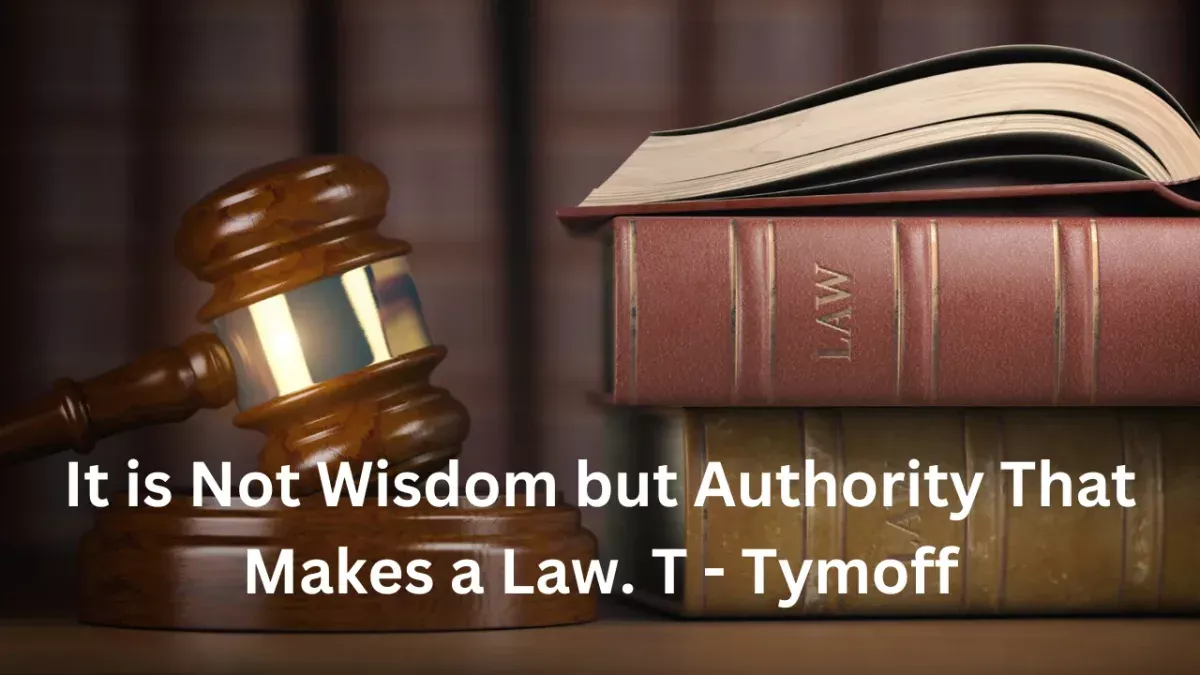The quote “It is not wisdom but authority that makes a law,” attributed to T. Tymoff, provokes significant reflection on the nature of legal systems and the foundation of laws. This statement underscores a critical distinction between the sources of law and the qualities of wisdom and authority. This article explores the implications of this quote, examining how authority and wisdom interact in the creation and enforcement of laws.
Understanding the Quote
The quote suggests that the power to create and enforce laws lies not in the possession of wisdom or moral insight, but in the possession of authority. Authority here refers to the institutional power held by governments, legislators, and other entities that create and implement legal frameworks.
Key Components of the Quote
- Wisdom: Generally understood as the ability to make sound decisions based on knowledge, experience, and moral understanding.
- Authority: The recognized power or right to give orders, make decisions, and enforce obedience.
Authority vs. Wisdom in Lawmaking
The Role of Authority
In any structured society, authority is essential for establishing and maintaining order. Laws created by those in positions of power are enforced through institutional mechanisms such as courts, police, and administrative bodies. The legitimacy of these laws often stems from the authority granted to lawmakers through constitutions, electoral processes, or other forms of social contract.
The Role of Wisdom
Wisdom in lawmaking involves the application of ethical principles, understanding of human behavior, and foresight into the consequences of laws. Ideally, laws should be crafted with wisdom to ensure they are just, effective, and beneficial to society.
The Interplay Between Authority and Wisdom
Real-World Implications
In practice, the creation of laws often involves a complex interplay between authority and wisdom. While authority provides the power to enact laws, wisdom ensures that these laws are fair and just. However, there are numerous instances where authority overrides wisdom, leading to laws that may be legal but not necessarily just or wise.
Historical and Contemporary Examples
- Historical Example: The Nuremberg Laws enacted in Nazi Germany were legal under the regime’s authority but lacked any semblance of wisdom or justice, ultimately resulting in gross human rights violations.
- Contemporary Example: Various authoritarian regimes around the world have enacted laws to suppress dissent and curtail freedoms, relying solely on their authority without the backing of wisdom or ethical considerations.
The Ideal Lawmaking Process
An ideal lawmaking process would involve a balance where authority is exercised with wisdom. Legislators and policymakers would utilize their authority to implement laws that are informed by ethical considerations, empirical evidence, and the collective good of society.
Ensuring a Balance
- Democratic Processes: Democracies offer a mechanism for balancing authority with wisdom by allowing the electorate to choose their representatives and hold them accountable.
- Judicial Review: Courts can act as a check on legislative and executive authority, ensuring that laws conform to constitutional principles and human rights.
- Public Participation: Engaging the public in the lawmaking process through consultations and referendums can infuse wisdom into the legal system by reflecting the collective insights and values of society.
FAQs
1. Who is T. Tymoff?
T. Tymoff is a lesser-known figure whose quote has gained attention for its critical examination of the nature of law and authority. Further details about Tymoff’s life and works are not widely documented.
2. What does the quote imply about the justice of laws?
The quote implies that the justice of laws is not guaranteed by the authority that enacts them. Just laws require the infusion of wisdom, ethical considerations, and moral integrity.
3. How can societies ensure that laws are wise and just?
Societies can ensure that laws are wise and just by fostering democratic processes, ensuring judicial oversight, and promoting public participation in the legislative process.
4. Can laws be both authoritative and wise?
Yes, laws can be both authoritative and wise when those in power use their authority to enact laws that are informed by ethical principles, empirical evidence, and aimed at the common good.
5. What are the dangers of laws based solely on authority?
Laws based solely on authority without the guidance of wisdom can lead to injustice, oppression, and the erosion of fundamental human rights.
Conclusion
The quote “It is not wisdom but authority that makes a law” by T. Tymoff highlights a crucial aspect of legal systems—the distinction between the power to create laws and the ethical responsibility to ensure they are just. While authority is necessary for the enactment and enforcement of laws, wisdom is essential to ensure that these laws serve the greater good and uphold justice. A balanced approach that combines both authority and wisdom is crucial for creating a legal system that is not only effective but also fair and humane. As societies continue to evolve, striving for this balance remains a fundamental challenge and goal.
